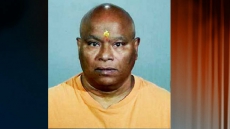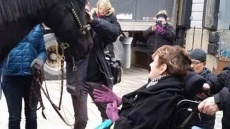EDMONTON — The chief of defence staff says the military is looking for a sensitive way to accommodate a service dog belonging to a soldier who suffers from post-traumatic stress disorder.
Gen. Jonathan Vance says he is "very likely" to side with Sgt. Jeffrey Yetman in his fight to keep his service dog at his side while visiting essential facilities at the Edmonton military base he calls home.
Yetman was recently informed that his service dog, Diego, was not permitted to accompany him to the mess hall, the gym and the family resource centre at Canadian Division Support Base Edmonton.
Yetman, who lives at the base, says the restrictions on his dog are making it harder for him to leave the house or go about his daily activities, because he relies on the emotional support his dog provides.
Vance says he's aware of the situation and hopes to find a way to accommodate all those involved.
But he notes the base must also balance the concerns of those who are afraid of dogs or who have allergies.
He says service dogs are a "contested area" when it comes to their therapeutic value, saying there is no "body of medical science" on their potential benefits for PTSD sufferers.
However, he also acknowledges there is "anecdotal evidence" that they can be helpful.
"I am grateful that his dog is making his life better," Vance says. "Believe me, I will very likely come down on the side of Sgt. Yetman in terms of his ability to access the base and the programs that he needs."

Capt. Donna Riguidel, a spokeswoman for the Edmonton base, says the problem is that Yetman's dog does not qualify as a service animal under Alberta's Service Dogs Act, which requires such dogs to be accredited by Assistance Dogs International.
Yetman got Diego from the Wounded Warriors organization and credits the dog with helping him turn his life around after he pleaded guilty to assault two years ago — an incident he believes stems from his PTSD.
“It was something I had to face. Something I owned. I decided not to hide from it. Diego brought me back from it. (I) hold my head up high again,” he said.
Yetman is in the process of being medically discharged from the Canadian Forces, after developing PTSD during several tours overseas, in countries including Bosnia and Afghanistan.



